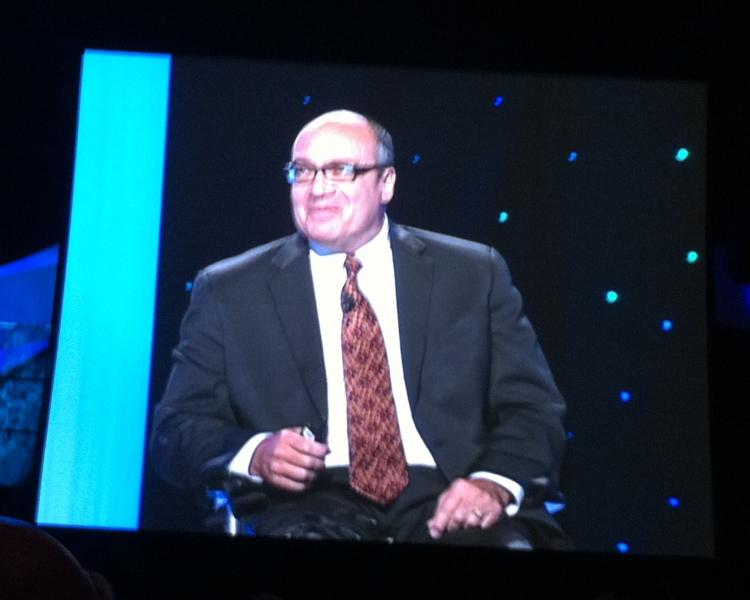 “Who pays the price for our unethical behavior? All of our loved ones.” This was the message of Patrick Kuhse, a public speaker and former stockbroker, during the Raymond James Financial Services’ National Conference for Professional Development in Orlando, Fla. this week. Using his own story of committing fraud, getting caught and serving jail time, Kuhse stressed just how important business ethics is as a financial advisor, and left attendees in awe.
“Who pays the price for our unethical behavior? All of our loved ones.” This was the message of Patrick Kuhse, a public speaker and former stockbroker, during the Raymond James Financial Services’ National Conference for Professional Development in Orlando, Fla. this week. Using his own story of committing fraud, getting caught and serving jail time, Kuhse stressed just how important business ethics is as a financial advisor, and left attendees in awe.
“Income is never the definition of us,” Kuhse said; it’s the choices and relationships that we carry with us.
Kuhse should know. After seeing the extravagant lifestyles and excess that his peers at Arizona State University had, he dropped out of college and became a successful stockbroker in San Diego. He got married, had two boys, and kept moving from large house to larger house. He moved his family 10 times in 10 years.
But one day, a friend offered him a position as the investment advisor for Oklahoma state’s investment portfolio. She had control of the capital, so Kuhse illegally bumped up his commissions. In one week, he made $411,000. By the 21st month, he was up $6.5 million.
But after the 23rd month, his friend fired someone at the portfolio, and that person went straight to the FBI. Instead of making a deal with the lawyers or turning himself in, Kuhse fled the country, taking his wife and two boys to Costa Rica. But Interpol, the International Criminal Police Organization, found him, and he kept running. He spent the next four years as an international fugitive; after three years, his wife decided to take the kids back to San Diego. After the fourth year, he called the U.S. embassy and turned himself in. He had to spend a month in a Costa Rican prison, where he witnessed murders non-stop.
When he came back to the U.S., he pleaded guilty and was sentenced to six years in prison, three years probation, and community service. He would never work in the securities industry again.
But Kuhse decided to turn a negative into a positive; in prison, he finished his college degree, earning a B.A. in liberal arts. After his probation, his sons accepted him back into their lives, and he lived with them through their high school careers, teaching them the importance of college and good decision-making.
“We’re all going to make mistakes. The question is, what are we going to do when we make those mistakes?”
Don’t want the same to happen to you? Here are Kuhse’s eight critical thinking errors that lead to unethical behavior:
- Entitlement: When you’re in entitlement mode, you think everything and everyone is above you, Kuhse says. Take Eliot Spitzer for example. The very auditing system that he created to monitor New York state employees was the one that caught him in the act of prostitution. “I call them Teflon people because nothing sticks to them.” Kuhse started having that feeling of entitlement when he saw what his peer group had—big houses, nice cars—and he wanted the same things.
- Super optimism: When you think nothing can go wrong.
- Affection Disconnection: This happens when you start putting your career before your family. Kuhse experienced this when he would jump from one opportunity to theh next just to make more money. He ended up moving his family 10 times in 10 years, and his wife was not happy.
- Seemingly Unimportant Decisions: When you start entertaining absurd proposals, be careful. Kuhse knew the offer to work with his friend in Oklahoma was a bad deal, but he told himself he needed it on his resume.
- Rationalization: “Everybody else cheats; why not me?”
- Lazy: Kuhse says 80 percent of fraud is caught by something the perpetrator did in anticipation. He didn’t want to go Oklahoma anymore, so he gave his friend an ATM with his name on it. “How smart was that?”
- Victimitis: This is the stage where you start blaming the laundry list of people for every malady in your life, while you continue to swirl in failure and personal drama. Rather than taking accountability for their own actions, they blow it off on somebody else.
- Situational Ethics: “Do we always look through the same ethical goggles in everything we do? Or do we look at a situation and decide which set of ethics is going to be applicable here?… Most of us speed on the freeway. How many of us would speed through a school zone with kids present? I’m guessing nobody.”
Any of these traits look familiar?
